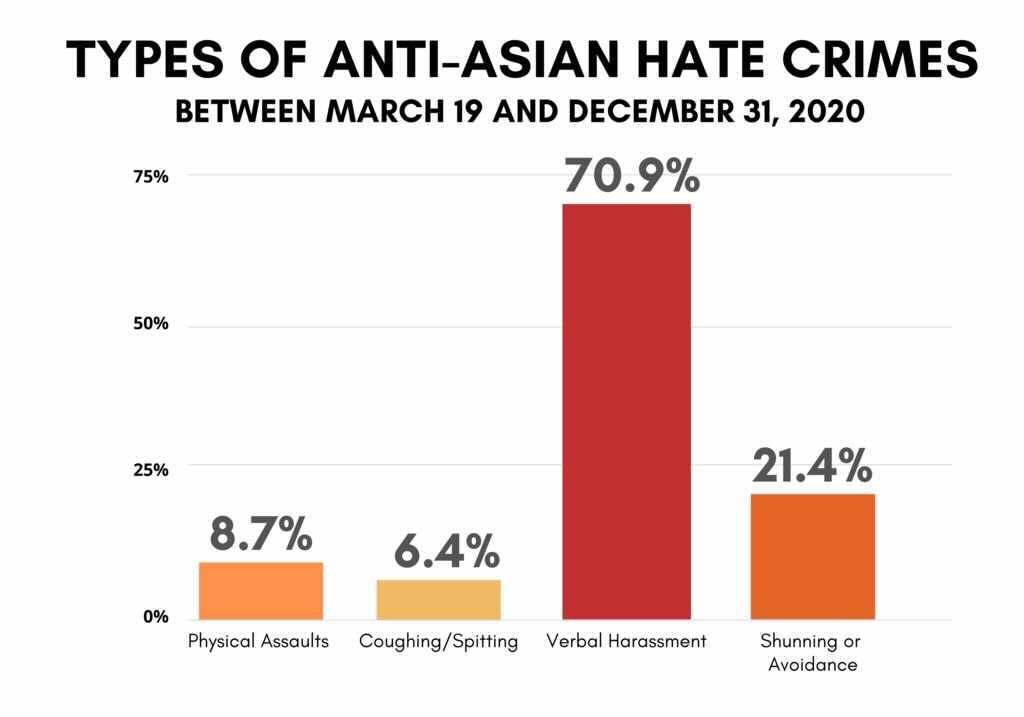Christine Nasife ’22 fears for her mother’s safety.
Nasife’s mother was born and raised in China and later immigrated to the U.S. Now, with the increase in anti-Asian hate crimes across the country in conjunction with the coronavirus pandemic, Nasife is afraid her mother may be targeted.
“I can’t help but be nervous for my mother when she goes out,” Nasife said. “I can’t help but be nervous for some friends of mine. I get nervous for other close friends at home.”
Nasife, a member of the Asian Student Association (ASA), said she describes her worries about her loved ones as “heart wrenching.”
“There is definitely that fear of having a relative or a close friend be attacked purely because of how they look and being told ‘Oh you brought the Chinese virus here,’” Nasife said.
Stop AAPI Hate, a national coalition aimed at addressing anti-Asian discrimination amid the coronavirus pandemic, reported receiving over 2,808 firsthand accounts of anti-Asian hate crimes across 47 states and Washington D.C. between March 19 and Dec. 31, 2020.
“Asian Americans have been the victims of thousands of racist attacks since COVID-19 began to spread in our country and continue to live in a climate of fear and discrimination that impacts their daily lives,” according to a Nov. 9 Stop AAPI Hate press release. “These attacks have been exacerbated by anti-Asian American rhetoric pushed forward by elected officials, as well as by dozens of policies from the previous administration.”
In Philadelphia, anti-Asian hate crimes increased by 200% from 2019 to 2020, according to California State University’s Center for the Study of Hate & Extremism.
Chunrye Kim, Ph.D., assistant professor of sociology who researches crimes against vulnerable populations, said these acts of hate are “nothing new” for Asian Americans and Pacific Islanders (AAPI).
“Because of COVID-19 and government factors, there is an increased number, but at the same time, it’s not like it never happened before,” Kim said.
The City of Philadelphia, which issued a statement on Feb. 24 about how the city is responding to the national increase in crimes against Asian Americans, said “racialized targeting of Asian Americans and Pacific Islanders is not new.”
“We’ve seen the passage of the Chinese Exclusion Act of 1882, the mass lynching of 18 Chinese men and boys outside of Los Angeles in 1871, the detention of 120,000 innocent Japanese Americans during World War II, and the unlawful targeting of South Asian and Muslim Americans after 9/11,” according to the press release. “We are reminded that the racism many are experiencing today is a reflection of old prejudices and scapegoating that have persisted throughout generations.”
Kim, who identifies as Korean, said because she is a faculty member, people avoid making racist comments to her, even if they may have negative attitudes about Asians. But that is not the case for her outside of the university community.
“If I go out, I just become a vulnerable Asian female,” Kim said.
Nasife said to counteract anti-Asian racism at St. Joe’s and in the surrounding areas, she would like to see more support for organizations within the Center for Inclusion and Diversity.
“It would be really impactful to see [support in] the St. Joe’s community especially because the majority here are white students,” Nasife said. “So having that rally of people who are in those positions that will support us and we know that aren’t against us. Having silence kind of defeats the message if you’re just sitting back and just watching it instead of actually listening and caring about it.”
Abra Verzola ’23, president of ASA, said performative allyship is easy, but real allyship requires continuous effort.
“I think having the conversations, not just with somebody on the street that would yell something at you, but also with your friends to call out racist behavior,” Verzola said. “Make your intentions as a human being clear that acting that way towards someone because of their race is unacceptable.”













































